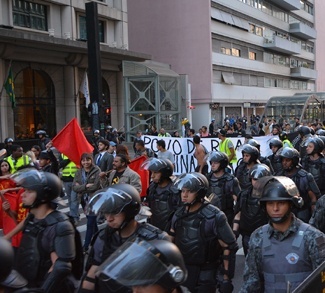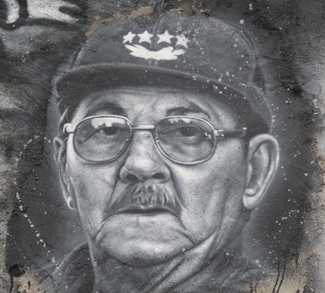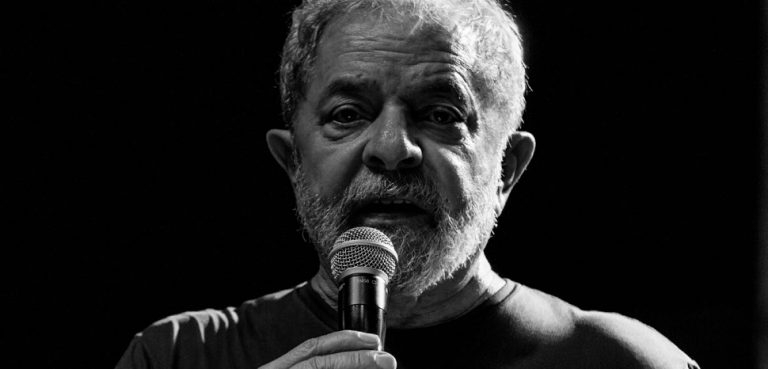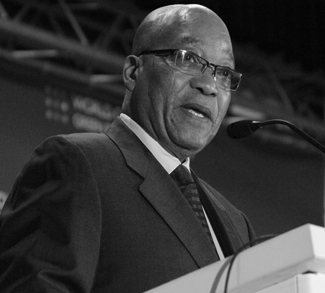In the weeks leading up to the World Cup, Brazil experienced a wave of grassroots mobilization and widespread demonstrations, where a nation-wide sense of political malaise flooded onto the streets. This wave of popular dissatisfaction eventually took the shape of a loose social movement against the Brazilian government’s decision to commit substantial economic resources to preparations as a host country. Brazil spent an estimated $11 billion dollars on various stadium projects in the lead-up to the tournament, and there have been several high-profile instances of local communities being uprooted in order to make room for incoming tourists. Many believe that this money could have been better spent on health, education, and social programs.
The national mood as a whole appeared far more subdued towards the World Cup as compared with previous years. The patriotic yellow and green decorations that adorned the country’s streets during previous competitions were often swapped for poster boards, pickets, and hash tags such as #NãoVaiTerCopa (there will be no Cup).
Gaining the coveted designation of host country presented Brazil with an identity crisis of sorts. The once passionately-followed, culturally-significant sport of soccer was transformed into a calculated business venture in the eyes of many people. Yet for the government, Brazil’s hosting of the Cup provided a golden opportunity to cultivate the image of an emerging, economically-competitive global power, even if – as the protests suggest – this image does not represent the reality of most Brazilians.
Appropriating the spectacle of the World Cup to express dissatisfaction with the government has allowed the people to regain and redefine their identity while pushing back against the government’s economic priorities. The event attracts huge amounts of international and domestic media attention, providing a useful medium for protestors to convey their dissatisfaction, garnering national and international visibility for their cause.
Though the action on the pitch has now taken some of the spotlight away from the protests, the question remains: will this movement’s newfound visibility have any effect on presidential elections in October?
Recent demonstrations echo the social upheaval surrounding the 2013 Federation Cup in Brazil. Initiated by the Free Fare Movement, the 2013 riots were originally aimed at decreasing transportation costs before they devolved into a more general disenchantment with President Dilma Rousseff’s inability to continue her political predecessor’s legacy of social reforms.
President Rousseff came to power in 2011 on the political platform of the Workers Party (PT), which represents one of the most prominent left-wing movements in Latin America. She entered office on the heels of President Luiz Inácio Lula da Silva’s departure. Popularly referred to as Lula, the former head of the PT enjoyed cult status as a national advocate for the poor, and he also fixed Brazil’s political alignment with the emerging Latin American left.
Lula’s popularity stemmed from his transformation of the country’s past oligarchic regime into one centered on meaningful social change. Despite toning down his platform during his time in office to “Lula light,” in which he adopted a less radical socialist regime and more neoliberal policies, Lula maintained a commitment to social reform. Lula attempted to reduce poverty using grant policies for low-income families such as the Bolsa Famillia program. In addition, he increased wages and maintained low inflation rates. As a result of his policies during his first term in office, the number of people living in absolute poverty in Brazil decreased from 49 to 29 million, the middle class grew by 29 million people, and income inequality was substantially reduced.
Lula’s popularity stemmed from his transformation of the country’s past oligarchic regime into one centered on meaningful social change.
After Lula’s departure, Rousseff was left to manage her emerging democratic nation’s growing appetite for social reforms. When the protests broke out in 2013, she pragmatically opted for a conciliatory response by proposing progressive reforms in public transport and education. She took a more hardline approach to the recent World Cup protests, however, insisting that the country has spent more than two hundred times as much on health and education since the beginning of preparations. She also insists that World Cup-related infrastructure spending will continue to benefit the people of Brazil long after the last tourists fly home.
It is clear that the World Cup mobilizations have produced some turbulence for Rousseff’s re-election campaign. Last year, Rousseff enjoyed a 79% approval rating and was the preferred presidential candidate of a majority of voters in upcoming October elections. By February, her approval ratings had fallen to 55%, and as of last month, they had dipped once more to 34%,raising concerns that the Cup protests were putting her re-election prospects in jeopardy.
However, a Datafolha poll released Wednesday shows Rousseff’s first increase in popularity this year to 38% suggesting that, contrary to the views of her critics, the Cup may actually be diverting the country’s attention away from concerns about public spending. Her main competitors in the election, Aecio Neves of the Brazilian Social Democratic Party and Eduardo Campos of the Brazilian Socialist Party, also enjoyed a slight increase in the polls to 20 and 9 percent respectively.
To win the presidential election on October 5, Rousseff would have to garner at least 50% of the vote, otherwise a second run-off election will be triggered. At this point, analysts believe that a run-off is likely based on the long-term trend in the polls. If latest estimates are any indication, however, Rousseff’s tough response to protesters and the brief reprieve afforded by the recent shift in the country’s attention may allow her to maintain, and possibly increase, her lead. It will thus be the matter of how Rousseff responds to the demands of her people after the competition has run its course that determines whether she can regain her former popularity or drown in a sea of protests.




